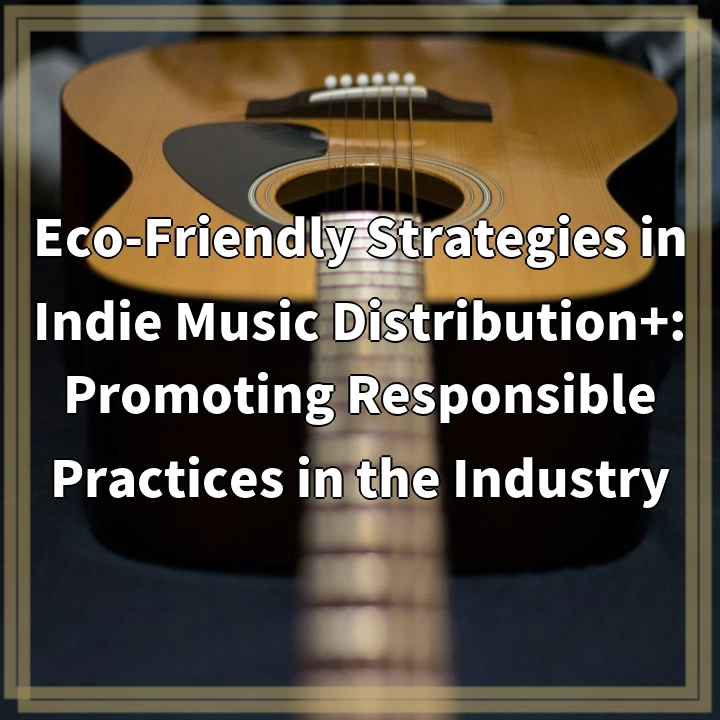
What it is:
Eco-Friendly Strategies in Indie Music Distribution refers to the implementation and promotion of environmentally conscious practices within the independent music industry. As the world becomes increasingly aware of the need for sustainability, the music industry is also recognizing its role and responsibility in adopting eco-friendly approaches.
Indie music distribution involves various processes such as recording, manufacturing physical copies, packaging, shipping, and promoting music. While these activities have traditionally had significant environmental impacts, the focus has shifted towards finding sustainable alternatives and reducing the industry’s carbon footprint.
By embracing eco-friendly strategies, indie musicians and record labels can help minimize their environmental impact, contribute to conservation efforts, and inspire positive change within the industry.
Real-World Problems:
The music industry, including indie music distribution, has been associated with several environmental problems:
1. Carbon emissions:
The transportation of physical music media, such as CDs and vinyl records, contributes to carbon emissions due to long supply chains and excessive packaging. Additionally, touring and live performances result in large carbon footprints from travel, stage setups, and energy consumption.
2. Waste generation:
Physical media production generates waste from materials like plastics, metals, and paper. Discarded CDs, vinyl records, and packaging end up in landfills, causing long-term environmental harm.
3. Energy consumption:
The energy-intensive nature of music production, distribution, and live performances relies heavily on electricity. This energy consumption contributes to carbon emissions and puts a strain on natural resources.
4. Unsustainable sourcing:
The extraction of raw materials for music production equipment, such as electronics and musical instruments, can have negative environmental and social impacts if not sourced responsibly.
5. Limited access to eco-friendly alternatives:
Many indie musicians and record labels face challenges in sourcing eco-friendly production materials and finding green alternatives due to limited availability, affordability, or lack of information and awareness.
To address these real-world problems, it is essential to explore and implement eco-friendly strategies in indie music distribution, encouraging responsible practices and fostering a more sustainable industry.

Solutions to Real-World Problems:
1. Carbon emissions:
One solution to reduce carbon emissions in indie music distribution is to prioritize digital distribution platforms. By emphasizing digital media formats like streaming and downloads, physical transportation and packaging can be minimized, significantly lowering carbon footprints. Additionally, artists can consider eco-friendly packaging alternatives and opt for local or sustainable touring options to reduce travel-related emissions.
2. Waste generation:
To combat waste generation, artists can explore sustainable packaging options such as using recycled or biodegradable materials for CDs, vinyl records, and merchandise. Adopting a “sell less, but sell better” approach can also help reduce overproduction and unnecessary waste. Furthermore, promoting recycling and proper disposal of physical media among fans can contribute to a circular economy.
3. Energy consumption:
Artists can take several steps to minimize energy consumption. These include using energy-efficient equipment, optimizing studio and venue lighting, and seeking renewable energy sources for powering venues and events. Artists and labels can also encourage fans to participate in carbon offsetting programs or support renewable energy initiatives.
4. Sustainable sourcing:
Prioritizing responsible sourcing of musical instruments, recording equipment, and merchandise is crucial. Artists can choose brands that follow sustainability standards or look for instruments made from ethically sourced and sustainable materials. Supporting fair trade and eco-friendly practices in the manufacturing process can help mitigate negative environmental and social impacts.
5. Access to eco-friendly alternatives:
Efforts should be made to increase the accessibility and availability of eco-friendly alternatives for indie musicians and labels. This can include raising awareness about sustainable suppliers, providing resources for eco-friendly packaging and production materials, and fostering collaborations and networks within the industry to share information and best practices.
By implementing these solutions, indie musicians and labels can showcase their commitment to environmental stewardship, inspire fans to adopt sustainable habits, and contribute to a greener and more responsible music industry.















